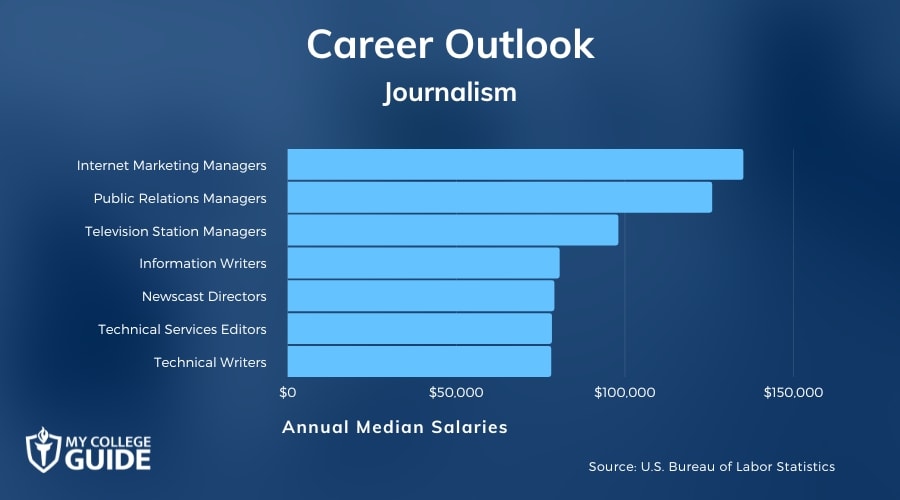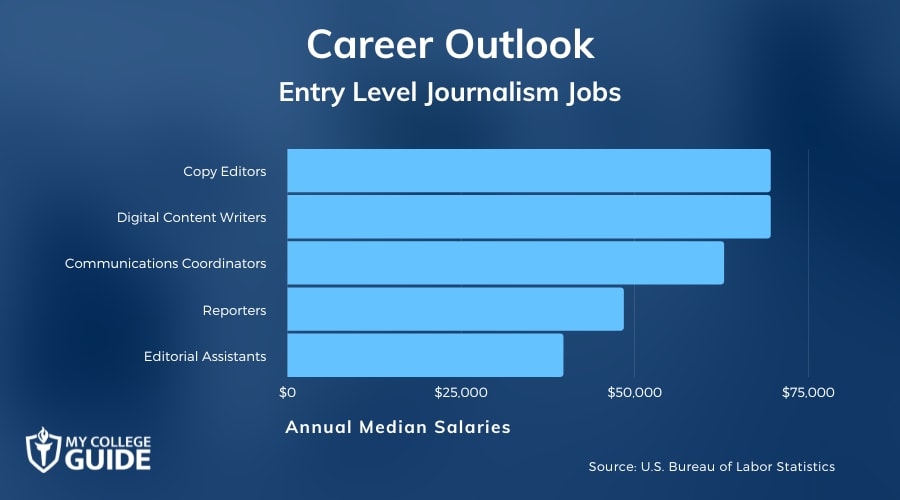If you want to build a career that revolves around research and the written word, journalism careers are an excellent way to share your skills with the world!

Editorial Listing ShortCode:
Whether you work in a traditional publications or lead an organization’s public relations (PR) or marketing efforts, the skills you learn over the course of your Journalism degree program will open the door to a number of lucrative, exciting careers.
What Can You Do With a Journalism Degree?

The field of journalism has changed over the last several years, and job opportunities have transitioned to incorporate the advancing technology in publication.
After earning your journalism degree, you will be able to work in a number of different industries that involve effective communication, including reporting, content writing, editing, and marketing. As with IT careers and careers in law, most journalism majors begin their careers in entry-level positions, but you may also have the opportunity to move up to top-paying occupations within a company.
Editorial Listing ShortCode:
The majority of the careers listed below report annual salaries above the national average across all occupations, according to the U.S. Bureau of Labor Statistics, and you may make more or less depending on your specific skillset.
10 Things You Can Do with a Degree in Journalism
The potential careers with a journalism degree may be diverse due to the wide communications skills journalism graduates may develop.
According to the U.S. Bureau of Labor Statistics (BLS), the median annual wage for news analysts, reporters, and journalists is $48,370. Along with these career paths, there may also be several other opportunities.
1. News Analyst, Reporter, and/or Journalist

Projected Job Growth: – 9%
News analysts, reporters, and journalists research develop, write and/or report on a variety of stories for print and web magazines, newspapers, television, and radio broadcasts.
What news or topics they may cover depends on their niche, or “beat,” and whether they are on assignment from their editor or following their own leads or story ideas.
2. Broadcast, Sound, and Video Technician

Projected Job Growth: 10%
If you’ve ever listened to a radio program or watched television, you can thank broadcast, sound, and video technicians for setting up and operating the equipment that produces them.
Broadcast, sound, and video technicians operate, maintain, and adjust sound, video, audio, and other equipment for programs, as well as synchronize sounds and speech with visuals.
3. Editor

Projected Job Growth: – 5%
Editors are responsible for revising, planning, and coordinating content and material for publication in web and print magazines, newspapers, websites, and more.
They also act as decision-makers on what content to publish, as well as verify facts and correct grammar errors. They may also work with journalists and writers on assignments.
4. Writer and/or Author

Projected Job Growth: 4%
Writers craft content for all types of publications, including but not limited to blogs, magazines, email newsletters, advertisements, television (commercial or movie scripts), and more.
Writers work closely with editors to develop content, so you may find them working for a magazine. Many also freelance or become authors of their own books.
5. Technical Writer

Projected Job Growth: 6%
Technical writers create journal articles, how-to guides, instruction manuals, packaging, and other documents that communicate complex technical information. Some also help write grant proposals for researchers, scientists, and academic institutions.
Technical writers may be found working with IT or technical companies, as well as at scientific research companies.
6. Film and Video Editor and Camera Operator

Projected Job Growth: 12%
Film and video editors and camera operators work behind the camera to adequately capture television programs, news or sporting events, films, documentaries, and more.
Editorial Listing ShortCode:
Along with operating the camera and determining variables such as lighting, they may also work with producers and directors to edit and arrange footage and film.
7. Public Relations Specialist

Projected Job Growth: 8%
Public relations specialists specialize in the communication between a brand or organization and the public. Typical duties may include crafting press releases, responding to requests for information about the organization they are representing, drafting speeches and arranging interviews for executives, and developing social media campaigns.
Overall, public relations specialist helps maintain their organization’s image and identity through communication with media and public outlets.
8. Photographer

Projected Job Growth: 9%
Photographers specialize in capturing images, whether for an image story for magazines, events (sporting events, political events, or even personal events like weddings), interviews, and more.
Photographers are skilled not only in the use of camera equipment but also in post-processing, image editing software, as well as lighting equipment, and compositional techniques.
9. Political Scientist

Projected Job Growth: 6%
Political scientists conduct research on the origin and operation of political systems and foreign relations, as well as evaluate the effects of political policies.
They monitor current political events, develop political theories, and analyze various data such as voter data, election results, and public opinion surveys. Political scientists may also forecast political and economic trends, as well as publish research articles and give presentations.
10. Public Relations and Fundraising Manager

Projected Job Growth: 8%
Public relations and fundraising managers help identify the ideal audience of an organization, as well as plan and direct the development of marketing and PR material that will enhance an organization’s image.
Public relations and fundraising managers also oversee and direct campaigns that bring in donations for organizations, including the drafting of grant proposals and communicating one-on-one with donors. Jobs for journalism majors can vary depending on their degree level.
Editorial Listing ShortCode:
A master’s in journalism may be needed for some high-level positions, such as a public relations and fundraising manager and/or a political scientist.
Online Degrees in Journalism

Journalism degrees are now offered online. Each degree varies in scope, and which one you choose depends on your goals.
- Associates in Journalism: This associates degree helps introduce students to the field of journalism while preparing them for assistant positions as editorial assistants, photographers, sound engineering technicians, and more. This is an ideal path for students looking to enter the field after completing a shorter, 2-year program.
- Bachelors in Journalism: A bachelors in journalism can prepare students for entry-level positions as a reporter, correspondent, editor, and more at news organizations, magazines, and radio and television stations.. This degree path typically takes 4 years to complete.
- Masters in Journalism: A masters degree in journalism is an advanced degree for students interested in specialized roles or management positions in the field. A typical masters takes between 1-3 years to complete.
- Doctorate in Journalism: Earning a doctorate in journalism can provide you with the opportunity to pursue advanced careers in research, academia, and/or as a senior leader in an organization. A decorate typically takes 3-5 years to complete.
These different degree paths may lead to various types of jobs for journalism majors in newsrooms, newspapers, magazines, television studios, and more.
Journalism Careers & Salaries

If you’re wondering what can you do with a degree in journalism, we have put together the following table that shows the list of the top 40 journalism careers & salaries according to data from the U.S. Bureau of Labor Statistics.
Here you will find information on the job duties associated with the different journalism career ideas, as well as their median annual salaries:
| Careers | Annual Median Salaries |
| Internet Marketing Managers | $135,030 |
| Public Relations Managers | $125,780 |
| Television Station Managers | $97,970 |
| Information Writers | $80,560 |
| Newscast Directors | $79,000 |
| Technical Services Editors | $78,270 |
| Technical Writers | $78,060 |
| Professors of Communication and Writing | $77,560 |
| Technical Writers, Publishing Industries (Except Internet) | $75,710 |
| Writers and Authors | $69,510 |
| Scientific Writers | $65,210 |
| Market Research Analysts | $63,920 |
| Editors | $63,350 |
| Public Relations Specialists | $62,800 |
| Film and Video Editors | $62,680 |
| Media and Communication Workers | $62,340 |
| Librarians and Media Collections Specialists | $61,190 |
| Newspaper Editors | $61,060 |
| Producers, Radio and Television Broadcasting | $60,550 |
| Sports Broadcasters | $59,760 |
| Survey Researchers | $59,740 |
| Broadcast Photographers | $50,130 |
| Radio and Television Broadcasting Reporters | $49,720 |
| News Videographers | $49,230 |
| Interpreters and Translators | $49,110 |
| Film Editors, Television Broadcasting | $49,100 |
| Film and Video Editors | $48,920 |
| News Analysts, Reporters, and Journalists | $48,370 |
| Data Analysis Assistants | $48,160 |
| Radio and Television Broadcasting Film And Video Operators | $47,240 |
| Photographers, Newspaper | $47,130 |
| Broadcast Technicians | $44,740 |
| Editorial Assistants | $43,940 |
| Photographers | $38,960 |
| Journalists, Newspaper | $38,210 |
| Correspondence Representatives | $37,920 |
| Investigation Clerks | $37,900 |
| Radio Hosts | $37,630 |
| Market Research Interviewers | $37,220 |
| Radio Broadcasting Announcers | $33,110 |
When comparing jobs you can get with a journalism degree, it’s helpful to keep in mind the overall journalism career outlook.
The BLS projects that writers and authors will see a 4% occupational growth over the next 10 years. Additionally, those using their journalism skills in public relations can expect to see 8% growth respectively within this same timeframe.
Editorial Listing ShortCode:
If you’re interested in pursuing a fast-paced career that allows you to develop your passion for the written word, journalism is an excellent starting point. By learning these advanced technical and research skills, you will become a valuable asset to modern business across a variety of industries.
Communication will always be an essential skill set in the professional workforce, and a journalism degree prepares you to jump right into a rewarding career after graduation.
How to Know if a Degree in Journalism is Right for Me

The field of journalism is a dynamic, high-pressure, creative, and rewarding field. Earning a degree in journalism may be for you if:
- You desire to make positive impacts on local communities and on society at large by bringing attention to causes, events, people, and ideas.
- You desire to be a lifelong learner who is dedicated to uncovering facts, unraveling mysteries, and getting to the heart of stories.
- You work well under pressure and in fast-paced situations that require superior communication skills to navigate.
- You are interested in not only being a mover and shaker but also meeting other experts and high-profile individuals that can drive local and societal change.
Earning a degree in journalism is also for those with attention to detail, a high level of ethics, and who desire to create profound change by elevating cultural, political, and societal topics. If the idea of working for a publication and researching stories, conducting interviews, reporting, or even photographing events intrigues you, then a journalism degree may be for you.
Is Financial Aid Available?

Most students pursuing a journalism degree will need financial assistance. Luckily, there are several financial aid options available.
One option may be to consider scholarship and grant opportunities. Both scholarships and grants are available for all types of majors and specific life situations. Another option may be looking into Federal and State Aid programs. These can provide aid in the form of loans and will vary based on your financial situation and state.
To apply for financial aid and determine your eligibility, you can start by filling out the Free Application for Federal Student Aid (FAFSA) form.
What Is a Journalism Degree?

A journalism degree is a degree program that provides you with an expansive foundation in communication and the written word.
Throughout your course of study, you will learn effective research techniques and the technical skills needed to succeed within the industry. You will also be exposed to a number of technological tools that are necessary for professional journalism careers in the modern workforce.
Editorial Listing ShortCode:
Journalism is a broad field, and during your degree program you will take a number of important courses that cover the following topics:
- News writing and editing
- Ethics and laws in journalism
- Reporting and news gathering
- Advanced research methods
- Digital and media literacy
If you are looking for a personalized educational experience, consider one of the many online journalism degrees available at accredited universities. By earning your degree online, you will have the flexibility to work at your own pace and log on to your classes at a time that suits your busy schedule.
Is Journalism a Good Major?

Yes, journalism is a good major for many undergraduate students. The diverse skills acquired on a journalism degree path may lead to diverse opportunities in all types of media organizations, depending on the type of journalism you want to pursue.
Careers may include a range of possibilities, from working as a journalist at a newspaper or magazine to becoming a photojournalist, reporter, or even getting involved in public relations. High-level degrees may also lead to management and editorial positions, as well as research-focused careers, such as political scientists, which can earn you up to $122,510 per year according to the BLS.
Where Do Journalism Majors Work?

Professionals who major or majored in journalism may be found at all types of media organizations, including and ranging from national television news networks to newspapers.
They may also be found writing for both print and digital magazines, or even working with radio broadcast networks. Some others may also work independently or freelance, reporting from various locations around the world.
Where journalism majors work largely depends on their “beat,” or niche and style. Journalists in the cultural or art realm may work for magazines, for instance, while political journalists may work for a newspaper.
What Skills Do You Learn in Journalism?

Journalism degree jobs typically require a specific set of skills, which journalism majors aim to provide. These may include:
- Communication: Clear, accurate, and engaging written and oral communication skills are one of the most important skills emphasized in journalism. This allows journalists to craft newsworthy and dynamic stories.
- Problem-solving: Many journalists may face situations and stories where information is difficult to find. Problem-solving skills are emphasized in journalism in order to prepare graduates to navigate roadblocks and difficult projects.
- Interviewing: Interviewing subjects as story sources is critical for journalists. Developing interviewing skills allows them to effectively draw out stories, quotes, and information from sources.
Other skills you may learn include research, storytelling, ethics, and multitasking.
How Much Do Journalists Make?

According to the BLS, the median annual wage for news analysts, reporters, and journalists was $48,370. Salaries tend to vary depending on where journalists are employed, their niche, and other factors.
Editorial Listing ShortCode:
Some journalism majors may also choose careers related to journalism, such as becoming an editor where you could earn up to $63,35 per year, or even a video technician, which can earn up to $48,790 depending on experience and education. Journalists may also become self-employed or freelance, which can create an even broader salary range.
What Are Some Entry Level Journalism Jobs?

The communication skills acquired from a journalism major may make graduates eligible for a variety of entry-level careers in journalism. These include the following jobs and their annual median salaries based on data from the BLS:
- Reporters: $48,370
- Editorial Assistants: $39,680
- Copy Editors: $69,510
- Digital Content Writers:$69,510
- Communications Coordinators: $62,800
Entry-level salaries may vary depending on your location, niche, and other factors.
What’s the Difference Between Communications vs. Journalism?
While media communications and journalism are often found in the same department at universities, they aren’t one and the same.
- Communications: Media communications focuses on the different production technologies used for mass communications.
- Journalism: Journalism focuses on researching and writing or producing for newspapers, magazines, news networks, and more.
Both majors may work in the same organization, yet have differing duties. A communication graduate may focus more on video or audio technology, while a journalism graduate may focus on writing, reporting on, or even editing a news story.
Is a Journalism Degree Worth It?

Yes, a journalism degree is worth it for many professionals. Jobs for journalism majors may be diverse due to the unique skill set a journalism degree can provide.
Storytelling, enhanced communication, and research skills may make journalism graduates competitive candidates in many media organizations, including newspapers, magazines, radio and news stations, public relations, advertising, and more. According to the BLS, writers, and authors are expected to see a 4% increase in job growth over the next decade.
Editorial Listing ShortCode:
A journalism degree may also offer workplace flexibility, depending on experience. Some journalists even choose to freelance for their career path, which allows them to pursue many of their own story ideas.
Getting Your Journalism Degree Online

Earning your journalism degree online may be a convenient way to gain the skills required to enter the rewarding field of journalism.
The diverse communication skillset graduates can acquire may equip them for a variety of career opportunities in media and news organizations that foster change through storytelling. If you’re interested in writing, storytelling, photography or videography, research, or reporting in order to make a difference in your community or society, then earning a degree in journalism may be ideal.
You can begin your journey by researching accredited online schools today.
